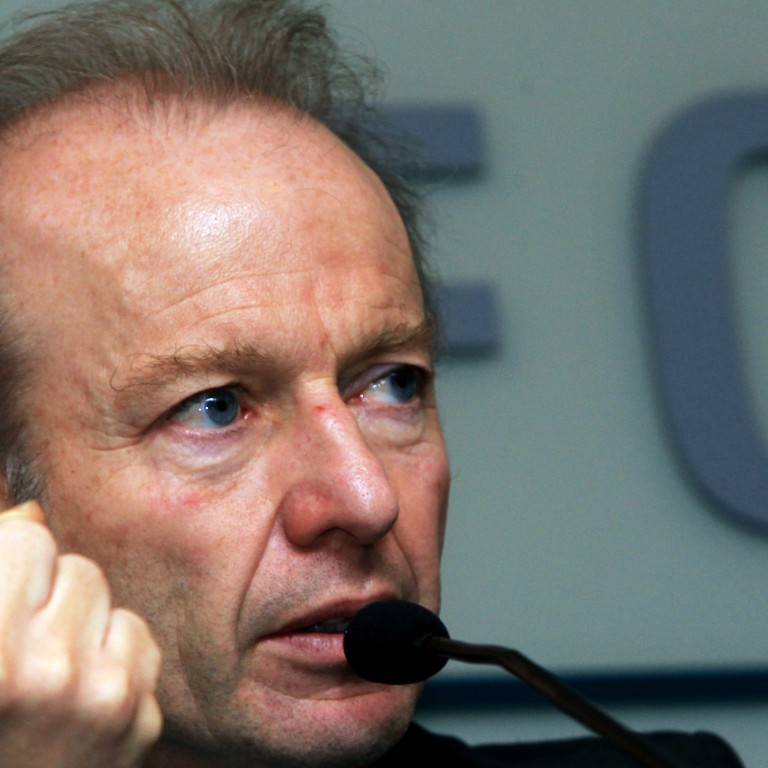
New | Market watchdogs in tussle versus central banks
An uneasy truce between market watchdogs and central banks struck during the financial crisis is showing signs of strain as they look for ways to tackle potentially extreme volatility in bond markets when interest rates start to rise.
The watchdogs are worried central banks will try to impose bank-style rules such as capital requirements on market players like asset managers and specialist funds.
While that might improve the market players’ ability to withstand big swings in prices, it could lead to higher trading costs and so reduce liquidity -- possibly even increasing the volatility that market supervisors fear.
Time is running out to come up with an in-depth plan, as economists believe the United States will start raising borrowing costs in the autumn. Nervousness over an increase in rates from their prolonged, very low levels has already triggered wild bond market swings.
"We are at an inflection point," said Ashley Alder, chief executive of Hong Kong’s market supervisor, the Securities and Futures Commission.
"There is a new conversation between prudential regulators, who are rightly focused on fire-proofing banks, and market regulators, who deal with different concerns," Alder said.
As the 2007-09 financial crisis began unfolding, regulation focused on stability by forcing banks to hold more capital.
Central bankers were firmly in the driving seat at the Financial Stability Board (FSB), the regulatory task force coordinating rules for the Group of 20 economies (G20) and currently chaired by Bank of England Governor Mark Carney.
This central bank push ground to a halt last week when securities regulators such as Alder said applying bank-like rules to markets was wrong.
"We don’t regulate markets like we regulate banks," said Greg Medcraft, chairman of the global markets regulatory body IOSCO. "It is like creating a square peg for a round hole."
IOSCO, an FSB member, slammed the brakes on a proposal from the FSB to regulate the world’s biggest asset managers, an area traditionally under market supervisors.
The move was seen as symptomatic of more fundamental issues at play, said Nicolas Veron, a financial services expert at think-tank Bruegel in Brussels.
"There is an intense sense of frustration that central bankers are really harming discipline in the market place because they don’t understand how it works," Veron said.
The FSB proposals were due to be completed for the G20 summit in November, but IOSCO said there was a need to check whether asset managers needed extra regulation in the first place. There are already tested ways for dealing with big market sell-offs, it said, such as rules making it harder for investors to pull money from a fund in times of extreme market volatility.
Central bankers including Bank of England deputy governor Andrew Bailey, however, have said central banks may need to boost market liquidity in exceptional circumstances.
Jose Vinals, the International Monetary Fund’s head of capital markets, said last week central banks may need to be "market makers of last resort" as time is too short to come up with thought-out solutions before US interest rates change.
Market supervisors take a fundamentally different view.
IOSCO says investors should be aware that markets can go down as well as up.
"If you react to that by piling more intervention on intervention, you encourage more untoward risk taking and you end up with even greater amount of mis-priced risk," Alder said.
The tussle over the FSB’s longer-term plans for asset managers and the more immediate fate of bond markets have become intertwined.
"Wherever we land after this work and whatever guidance we develop, we need to be sure we don’t unduly stifle risk taking," IOSCO’s Medcraft said in a speech in Washington on Monday.
IOSCO’s push-back is also aimed at defending its regulatory turf against central banks.
"We must continue to strive to strengthen our presence in the FSB, where we are under represented," IOSCO Secretary General David Wright said. "When we look back in a few years’ time, it will maybe be seen as a turning point for IOSCO."
The FSB, most of whose members are not central bankers, had no comment for this article.
Market regulators are also keeping a close eye on so-called shadow banking -- the creation of bank-like credit on markets such as repurchase or repo agreements and money market funds.
During the financial crisis, policymakers pledged to crack down on the industry. The FSB has proposed few hard rules so far, and the issue may be moving down the political agenda as the focus at the G20 shifts from financial stability to boosting economic growth, with funding from markets seen as key to this.
But market supervisors are watching carefully. "We need to make a very clear case before we act," IOSCO’s Medcraft said.
Asset mangers are relieved market supervisors are beginning to reassert themselves.
"IOSCO’s statement was an affirmation of that and perhaps that’s more powerful than anything than the words in the statement itself," said Douglas Hodge, chief executive of PIMCO, the world’s biggest bond fund.

